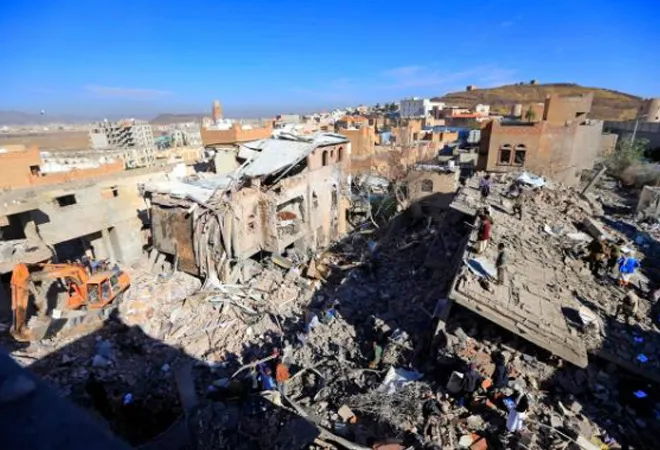
Introduction
The recent attacks on Abu Dhabi have signalled a worrying trend in the Yemeni civil war where Iran-backed Houthis have attacked targets in the United Arab Emirates (UAE). According to news reports drone strikes were responsible for starting a small fire in the Abu Dhabi Airport as well as an explosion in an industrial fuel area, where three people were killed and six more were injured.
The attack which took place in the morning of the 17th of January 2022, was claimed by the Houthis in an official statement as a retaliation for UAE’s activities in Yemen against its forces. Regardless of the target being UAE, the casualties were two Indians and a Pakistani signalling how conflicts in the region have the potential to affect Indian interests as well. This article thus, examines the Yemeni conflict, explaining how the civil war there has dragged India into international security complications like other conflicts in the region, and what steps India could take to mitigate such instances in the future.
Untangling the Yemeni conflict
Since 2014, Yemen has been embroiled in a seven-year-old civil war, when the Houthis, a powerful tribe of Zaydi Shias—a branch of Shia Islam—became the most dominant group of a broad opposition to the then President Ali Abdullah Saleh. Yemenis’ deep discontent with rising prices of food and fuel as well as significant corruption and Saleh’s intentions to install his family member as a successor, successfully forced him to step down as President after a 33-year long reign.
The Houthis, a militarily-experienced tribe living in North Yemen took this as an opportunity to take control of governance circumventing the authority of a Saudi Arabia-installed government led by Abdurrabbu Mansoor Hadi, a figure with strong support in the South of Yemen. The Houthis were also loosely supported by the Iranian Revolutionary Guards Corps (IRGC), who provided advanced military equipment and training, supplementing the Houthi’s own significant stockpiles acquired by bringing sections of the military into their fold.
Yemenis’ deep discontent with rising prices of food and fuel as well as significant corruption and Saleh’s intentions to install his family member as a successor, successfully forced him to step down as President after a 33-year long reign.
Due to Yemen sharing a long border with Saudi Arabia, it was considered as a nation within the sphere of the latter’s influence. Thus, when Iranian support for the Houthis became clear, Saudi Arabia interpreted this as an act of Iranian aggression considering the two nations’ long-standing rivalry with each other since 1979. This resulted in Saudi Arabia and its close ally, UAE, sending troops, air support, and military advisors to help the incumbent government fight off the Houthi Rebels.
Why UAE and why now?
While the UAE, also a significant power broker in Yemen, was initially quite involved within the war, its morale was damaged significantly when its citizens were killed in skirmishes with the Houthis. This led to the nation announcing its departure from the Yemeni conflict in 2019. However, its advisors were still involved with Yemeni troops, fighting the Houthis, leading to several aggressive campaigns against the latter since 2019.
In January 2022, UAE-backed forces began a giant push taking over the city of Shabwah, a vital access point to the strategically and financially fuel-rich province of Marib in a bid to secure it from Houthi control. This resulted in the Houthis threatening retribution and ostensibly causing the attack on the UAE.
UAE-backed forces began a giant push taking over the city of Shabwah, a vital access point to the strategically and financially fuel-rich province of Marib in a bid to secure it from Houthi control.
It is still unclear how the Houthis were able to operate drones all the way into Abu Dhabi from Yemen. Reasonable suspicion has also been cast on Iran, which is military more capable of conducting such a sophisticated attack on behalf of the Houthis. However, it is important to note that despite being supported by Iran, the Houthis have also developed policies independent of the latter thus, leaving the situation more confused.
Diplomatically, this attack is a blow to the efforts to bring peace between Iran and the Saudis as well Iran and UAE. Amidst these complications, India has some significant skin in the game that should lead it to evaluate its own options in the conflict.
Effects on India
It has become clear that this dispute in Yemen has affected Indian citizens. Apart from the massive evacuation efforts involving thousands of Indians in 2015, Indian citizens have also been killed in this recent attack. This follows the Houthis having commandeered a UAE-flagged ship a week ago, where seven out of the 11 crew members were Indians.
Moreover, a Houthi spokesperson has declared that it would continue to target the UAE if it did not scale down its military activities in Yemen. If more such attacks were to continue, it is likely that Indian citizens could continue to be harmed, given that Indians account for more than 30 percent of the total UAE population and are largely present in refineries and other strategic targets that the Houthis may attack.
A Houthi spokesperson has declared that it would continue to target the UAE if it did not scale down its military activities in Yemen.
India should also be in no doubt that the Houthis have the potential to carry out their threats. Apart from claiming several attacks on UAE (which Abu Dhabi denied), Saudi Arabia has noted that it intercepted more than 900 missile and drone attacks since the year 2015, demonstrating the capacity of the group. Thus, due to the sheer number of Indians engaging in different occupations across UAE and Saudi Arabia, the threat potential to Indian nationals remains escalated in this tense period.
As such, kidnappings and killings mean that India would have to employ some backchannel diplomatic footwork with all the parties involved to protect its citizens. Moreover, it also has to be careful about being targeted, given that it has previously provided medical support to injured soldiers fighting against the Houthis. This could mean Indian businesses in Yemen being targeted although that reality has been unprecedented.
Possibilities for India in the future
Going forward, India will be wary of the conflict dragging it in via Indian casualties. While the threat is still lesser than the situation during the Iraqi conflict, where the Islamic State had previously kidnapped and killed several Indians working there, the chances of it escalating remains strong.
Apart from claiming several attacks on UAE (which Abu Dhabi denied), Saudi Arabia has noted that it intercepted more than 900 missile and drone attacks since the year 2015, demonstrating the capacity of the group.
As such, India will have to strengthen its diplomatic heft with nations like Iran, which it has long maintained a good relationship with and with the UAE and Saudi Arabia, where ties have burgeoned significantly since the past decade or so. This will help India better navigate an atmosphere rife with rivalries, especially if attacks and kidnappings like the present ones take place. Simultaneously, it should also continue to maintain its neutrality within different Middle Eastern conflicts while projecting itself as a market for these nations to ensure that groups involved in conflict think twice when involving Indian targets.
Over time however, it is important for observers of West Asian politics to realise that due to India’s massive population spread over the region, there will be such incidents taking place. New Delhi thus, must try its best to strengthen its assets and protect its citizens throughout the region.
The views expressed above belong to the author(s). ORF research and analyses now available on Telegram! Click here to access our curated content — blogs, longforms and interviews.




 PREV
PREV


